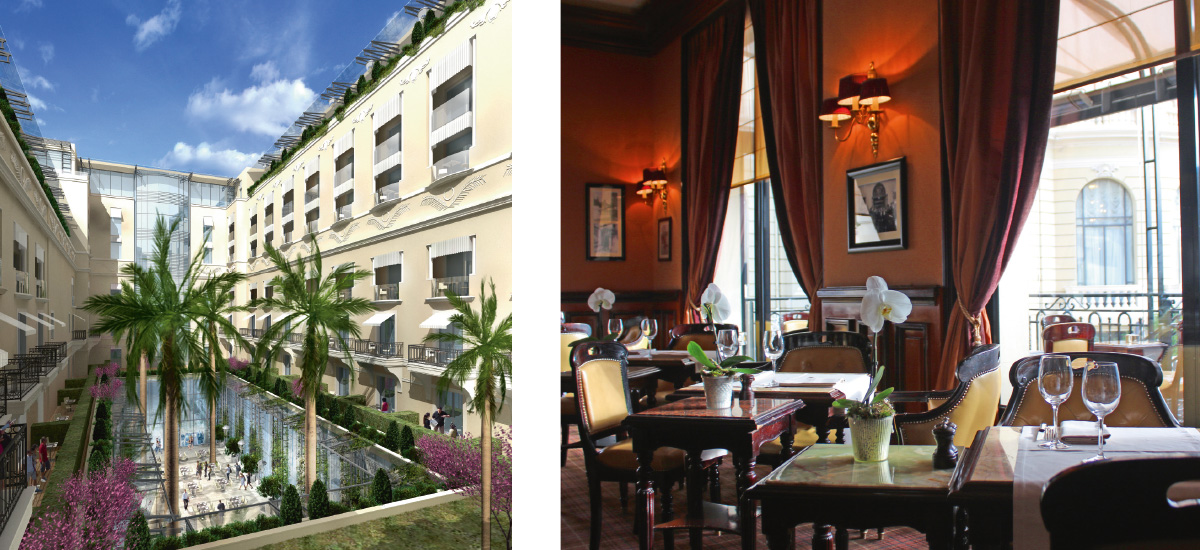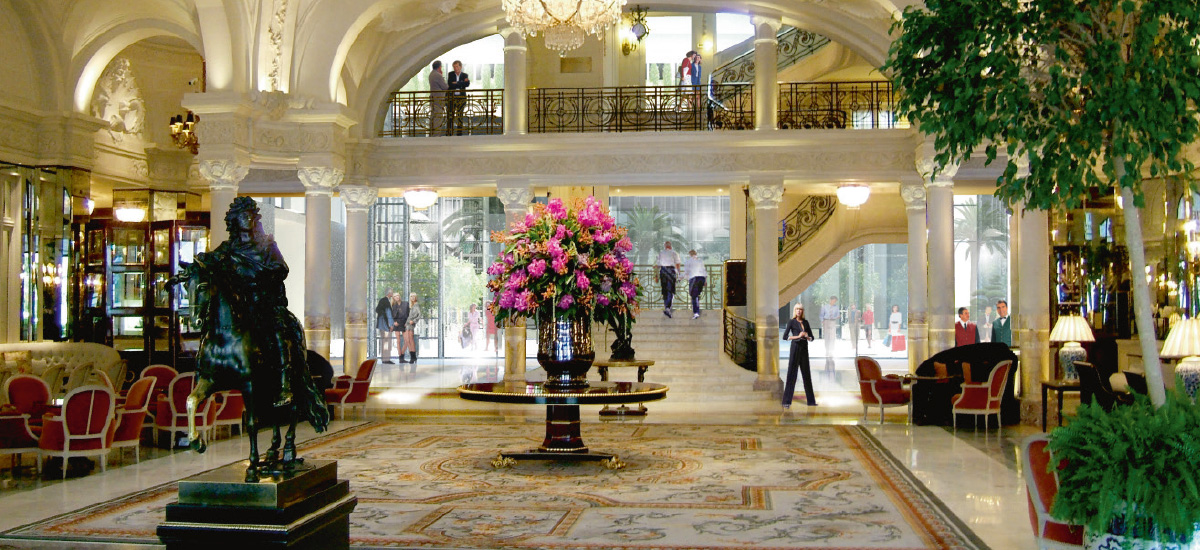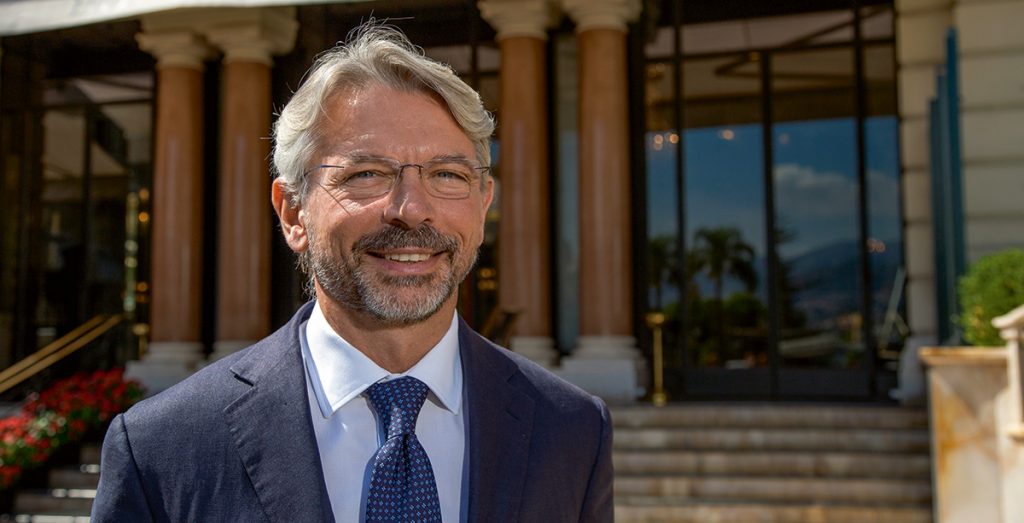Deep-reaching renewal, to keep the legend alive. It’s a need everyone has: whether they be great actors craving to stay on the crest of the wave, or champions of sport discharged, perhaps, too early from the teams they helped to win the most important trophies …
The hardest thing in a process like this is adapting to the new demands of the world while staying true to your own values, changing the way you respond just enough to manage to communicate and stay ahead, even in periods of intense change like the one we’re currently living through.
The same is true for society and its institutions, and even for the world’s grand hotels, those “Grand Palaces” that have always been the majestic witnesses and testimonials to the great events of history, to the changing epochs and the public and private stories of the world’s rich and famous.
It was inevitable that this should happen in Monte Carlo as well, to one of its most famous symbols, the Hôtel de Paris.
In this case, more than a simple renovation, the renewal is a veritable revolution. An entire section of the hotel has been literally razed to the ground to make space for a structure 20 percent larger in terms of accommodation capacity.
Obviously, in architectural terms, the Hotel conserves all of its iconic features: the facade, the hall, the American bar, the rotunda wing, the Empire room… the miracle of multiplying the rooms and number of guests will be achieved to the back, in the less visible portions of the building.
But the people who normally stay at this kind of hotel know full well that the challenge, an extremely risky one, is another: to preserve the soul of a Belle Époque structure with more than 150 years of history, while transforming it into a truly 21st century hotel. It’s a task that perhaps involves the people more than simply the structure.
There are families who have come to this hotel for generations, there are so many little luxuries that have to be preserved, all the special attention that every guest expects to receive as soon as they enter through that famous revolving door … and even more than the look of the new rooms, what’s really going to count is the capacity to keep welcoming guests, old and new, in the same way the hotel has for the last century and a half, and to make them feel truly special.
The man called in to direct this complex operation is Ivan Artolli, who to take up this challenge left a position of great prestige in the Rocco Forte Hotels Group where he had worked for the last fifteen years.
Italian, with a thirty-five year long career in the hotel business behind him, the Director met us in the hall created with the idea of “surpassing anything that has been created thus far”, in the words of François Blanc, founder of the Société des Bains de Mer.
Ivan Artolli has the characteristic traits of all great hotel managers: gentle, elegant, poised and with sincere interest in the people with whom he speaks, regardless of who they are, whether a Prince or a simple journalist.
We speak in Italian, he with an accent vaguely English at times, revealing the length of time he’s been abroad, a fact likewise confirmed by his perfect knowledge of French. Ivan Artolli will certainly have no problems communicating with his staff.

F.1.M. : You’ve been part of Hôtel de Paris staff in the past. Now, after all these years, you’re back as the hotel’s Managing Director. How do you feel about that?
I.A. : That’s true; I arrived here in 1983 from the Ritz Paris. I started in reception and stayed six years, managing to become assistant Front Office Manager, before going back to Paris. How do I feel? Well, certainly with a lot of responsibility!
The Hôtel de Paris has been the subject of an extremely significant investment. It can’t be described as a simple refurbishment, given that a large portion of the building has been completely demolished to make space for the new structure. Consequently the goal of the works was highly ambitious: to rekindle a legend. A really difficult task if you consider that the legend of the Hôtel de Paris is in turn part of another legend, that of the Principality of Monaco. It’s all very exciting indeed.

F.1.M. : You have come from a very important role in another hotel group, where you were a member of the executive board. In strictly technical terms, going back to managing a single hotel could be considered an odd choice. Can you explain it?
I.A. : I understand what you’re getting at. Let’s say that whether you’re the Operations Manager for several hotels, or Manager of a single department in a 5-star structure, you still have to be a leader of men. Being leader of a group of Managing Directors, who are each leaders in their own right, is probably harder, but being a leader basically means being able to make your team follow you, even if they don’t all agree with your strategies, they have to believe in you and your vision.
The reason I decided to return to Monte Carlo is because you don’t often get the chance to rebuild something that has had such a glorious past and which deserves to live again.
The complexity of my task is due to the fact that in the process of opening or re-opening a hotel of this calibre, it’s more often than not, one step forward two steps backwards, and there are so many unknown quantities.
In his book “Setting the table”, Danny Mayer explains that the road to success in the restaurant business is paved with well-managed mistakes. The concept of an infallible restaurant simply doesn’t exist. We’ll most likely make some mistakes along the way ourselves. It’s the way we manage to handle them that’s important, so our clients don’t notice them and are always totally satisfied with the experience we offer during their stay in the Principality.
Isadore Sharp, founder of the Four Seasons, says that you have to plan for everything to be able to effectively manage the unexpected. We have to prepare ourselves with a clear mind to be able to adjust those little imperfections we’re certain to find as we go about our work in a completely new setting with equipment that’s just been installed.
In our case, we’ve got our work cut out for us, making the transition from the original structure with forty rooms to a hotel with two hundred, four restaurants and a bar, with a turnover in the order of a few million Euro a year, without making some little mistakes or having to rethink the way certain new ideas have to be developed.
F.1.M. : Two hundred rooms is certainly an exponential increase in capacity.
I.A. : For the precision, the new hotel is going to have 201 new keys, which means there’ll be about 220 rooms, thanks to the floors that have been added to the side facing onto the Hermitage Hotel.
There’ll be three swimming pools as well: one for the Churchill suite, another reserved for the new 600 square metre grand suite, and the third for the little SPA. Naturally we’re still going to be linked with the Thermes Marins, but we’ll have our own smaller structure as well, with solarium, gym, hammam, sauna and open-air pool. It’ll be dedicated to all our clients who maybe don’t have the time for a proper visit to the Thermes, but nevertheless need a moment of relaxation.

F.1.M. : How do you manage the hotel’s guests and your team while the works are proceeding?
I.A. : Our responsibility is first and foremost towards the clients who choose to stay with us even during this particular time. We have to keep on seducing them, creating the “enchantment” that turns them into our most important ambassadors in the world. Browsing through some of the comments and reviews we get on-line, a lot of our clients agree that the care and attention they’ve received is so great it makes them forget all the noise and confusion associated with the works. That’s because we give every one of them individual attention right from the moment they walk through the door, and monitor their level of satisfaction even several times a day through their interactions with the various members of our team.
Then there’s all the planning that goes into the improvements we intend to introduce, for example, to do with the quality of the bedlinen, and all the amenities we’ll be providing in the rooms and bathrooms. We’re even creating a bespoke line that will be available exclusively to our clients.
We’re also developing a training program that will involve all the people working with us, to help us focus on the most important aspect, especially during this difficult period, which is obviously the personalised experience we create for our guests.
This goes beyond simply providing a service. We have to be able to anticipate their needs, with a level of attention towards them I wouldn’t hesitate to define as almost maternal; because there are other hotels in Monte Carlo offering services of a similar level, at lower prices. But people choose to come here not just for the service, but because we put so much into our work, surrounding our guests with such positive energy, it makes them feel valued and special. You can only achieve that kind of result if all members of the team are working in unison, and focussed on the experience of each individual guest.

F.1.M. : Changing the look of the hotel; aren’t you afraid of the reaction your historic clients might have, or do you feel it’s more important to concentrate on new clients, and amaze them with all the innovations?
I.A. : That’s a very good point.
Our team is particularly good with the clients they know. Sometimes we’re a little less so with the clients we meet for the first time. This obviously has a lot to do with human nature, but the secret of the Hôtel de Paris renovation is going to be precisely that of being just as good with our new guests as we are with the ones we know well.
We’ve got a significant number of clients who only want to stay at the Hôtel de Paris when they’re in Monte Carlo, regardless of the renovation works. They love just having to take these eight steps that lead straight to Place du Casino, and being able to go straight to their rooms from the Bar Américain without having to leave the building. This location is unique and nothing will ever take that away. My colleagues in other hotels work unceasingly to improve their services because they know that in terms of position, we are absolutely unbeatable.
But our staff members still need to get a clearer idea of how their work influences even those who aren’t guests of the hotel. I’ll give you an example: the other day I was talking with the people in one of our departments. They’re obviously concentrating on the task of serving and satisfying our guests without realising that there are thousands of other people observing them as they work, people who perhaps can’t afford to stay at the hotel, but who contribute greatly to spreading the legend of the Hôtel de Paris through their photographs and posts. We all have to work in unison, like in a perfectly choreographed dance. We have to transmit a feeling of harmony, so the people watching us can perceive that here there’s something special, something magical.
When Alain Ducasse chose a director to train our waiters, he did it for precisely this reason: we needed someone to teach them how to move, how to manage our guests with absolute harmony. He wanted to create the perfect balance and needed someone capable of managing the flow of the service in a harmonious manner.
This is the kind of service that made the Hôtel de Paris famous, and it’s our job to re-create it.
The Principality of Monaco is a truly unique place that’s building its future through a series of highly ambitious projects, and the new Hotel de Paris is a perfect example of this philosophy of excellence. Bon travail Monsieur Artolli!

